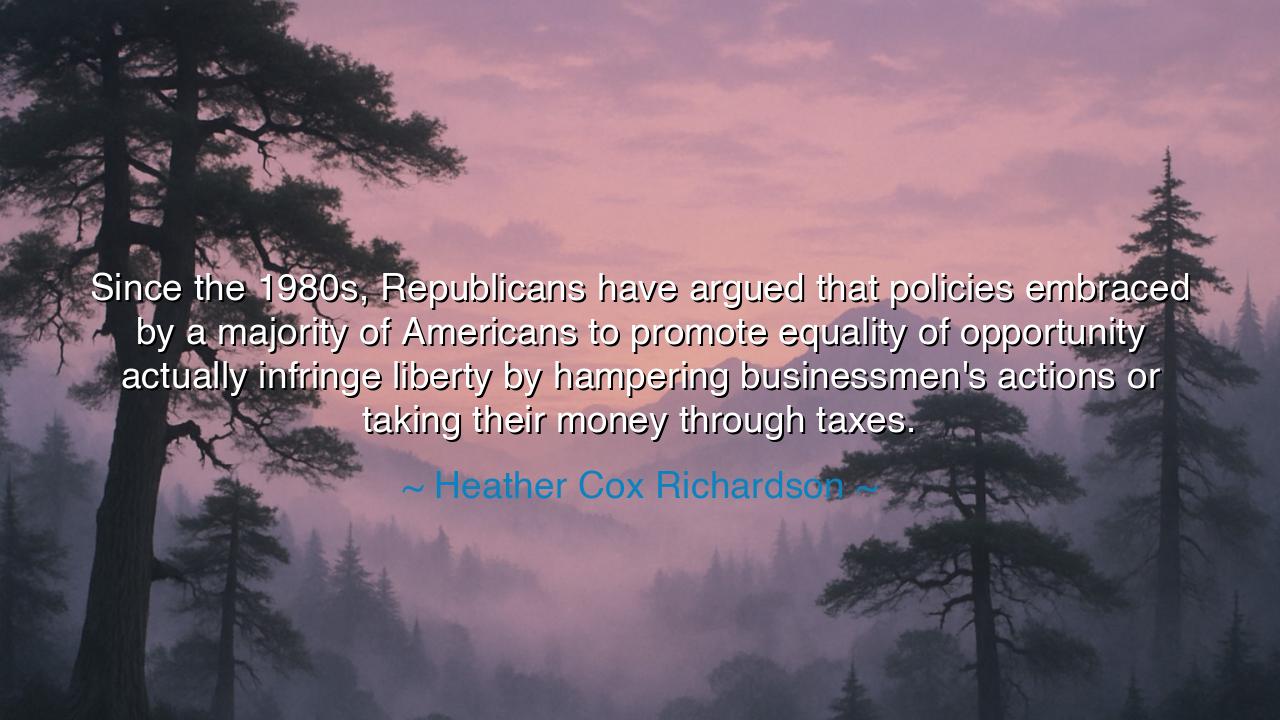
Since the 1980s, Republicans have argued that policies embraced
Since the 1980s, Republicans have argued that policies embraced by a majority of Americans to promote equality of opportunity actually infringe liberty by hampering businessmen's actions or taking their money through taxes.






In the great sweep of history, there have always been those who saw equality as a force of disruption, a challenge to the order of established systems. Heather Cox Richardson, in her words, sheds light on a crucial ideological shift: “Since the 1980s, Republicans have argued that policies embraced by a majority of Americans to promote equality of opportunity actually infringe liberty by hampering businessmen's actions or taking their money through taxes.” This statement captures the essence of a debate that has simmered for centuries—the struggle between liberty and equality, the tension between individual freedom and the collective responsibility to ensure that all members of society have a fair chance to thrive.
The ancients, too, wrestled with this very tension. In the Greek city-state of Athens, democracy was celebrated as a system that granted citizens the right to vote and participate in governance. Yet, the system was far from perfect, as slaves and women were excluded from political life. The tension between freedom for the elite and oppression for the marginalized was palpable. Socrates, that great philosopher, challenged the Athenians to reflect upon their notions of justice and equality, but his musings were often seen as a threat to the established social order. The elite, much like the business class of today, feared that greater equality would mean a loss of privilege, power, and wealth.
In the modern era, the debate that Richardson speaks of has become particularly prominent in the United States. The belief that equality of opportunity—the idea that all individuals should have the same access to success and resources—would infringe upon liberty has its roots in a political and economic ideology that views wealth and individual freedom as inextricably linked. Ronald Reagan, for example, championed the notion of economic freedom, arguing that government intervention through taxes or regulations was a form of tyranny that would stifle the creativity and innovation of the free market. In his vision, liberty was about unrestrained action, and any attempt to level the playing field through government action was a violation of liberty.
Yet, in the stories of the past, we see a different understanding of liberty—one that is not simply about the unchecked power of the rich and powerful, but about creating conditions for all to flourish. The abolition of slavery in the 19th century is an example of true liberty that extended freedom not just to a select few, but to an entire group of oppressed people. When Abraham Lincoln delivered the Emancipation Proclamation, he recognized that true freedom was not simply the absence of constraint, but the presence of opportunity—the ability for all people, regardless of their race or birth, to live with dignity and agency. Equality of opportunity, in this sense, was a foundation of the nation’s liberty—a liberty that expanded and deepened when the law recognized the inherent worth of every individual.
Similarly, consider the Civil Rights Movement of the 1960s, when Dr. Martin Luther King Jr. and countless others fought not just for the legal freedom of Black Americans, but for true equality—the right to live free from discrimination and to have equal access to the opportunities afforded by society. The resistance to these movements often came from those who feared that equality would diminish their own wealth or power. Yet, Dr. King’s vision of liberty was not one of unchecked freedom for the few, but one of shared prosperity for all, where the promise of freedom could be enjoyed by every citizen, not just the wealthy or privileged. This vision of liberty, where justice and equality work in harmony, stands in stark contrast to the ideology that Richardson highlights—the belief that liberty must be protected for those at the top, even if it means the continued oppression of others.
The lesson embedded in Richardson's reflection is profound: true liberty cannot exist without equality. Liberty, as the ancients understood it, was not the freedom to act without consequence, but the freedom to flourish in a society that recognizes the worth of all its people. Equality of opportunity is not a threat to freedom, but its foundation. For a society to be truly free, it must provide all of its members with the means to pursue their happiness, their livelihood, and their dreams. The fear that equality will hamper the ambitions of the rich is rooted in a misunderstanding of what liberty truly is. True freedom is not the absence of rules or the preservation of privilege, but the assurance that everyone has the chance to pursue a fair and just life.
So, in our own time, let us reflect upon what freedom means. Is it the right of a few to prosper at the expense of the many? Or is it the ability of every person to stand equal before the law, with equal opportunities to live a life of dignity and fulfillment? Equality is not a threat to freedom; it is its fulfillment. Let us work toward a society where liberty is not just the preserve of the powerful, but is shared by all—a society where the promise of opportunity is not a fleeting ideal but a living reality. Through justice, through opportunity, and through the willingness to build a better future for all, we will create a society where true liberty flourishes.






AAdministratorAdministrator
Welcome, honored guests. Please leave a comment, we will respond soon